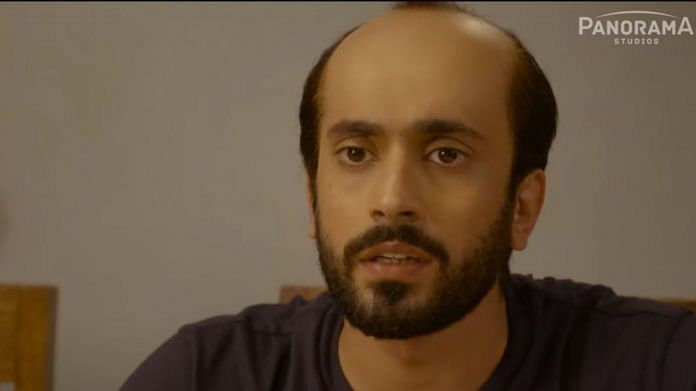What do you look for in your ideal partner? Despite what we all like to believe (“They just have to be nice and kind”), we all secretly have long lists that dictate whether a person is worthy of our love. While the list is conveniently forgotten once we do find someone we connect with, it does form a very important entity in our minds. Abhishek Pathak’s Ujda Chaman takes a look at how this superficial list hinders our every step toward finding happiness.
The film tells the story of Chaman Kohli (Sunny Singh), a 30-year-old Hindi professor whose most prominent feature is his balding head. Everyone, from his students to strangers, makes fun of his lack of hair or points it out in some embarrassing way. This especially becomes a problem when it comes to prospective brides, who seem to like everything about him, but reject him when they see his balding reality.
Chaman and his family try and find him a suitable match through any means necessary, when they learn he needs to get married before his 31st birthday. While every opportunity fails, an unlikely and desperate attempt at online dating brings Chaman face-to-face with Apsara (Maanvi Gagroo), a 29-year-old make-up artist, who has issues with her weight. The two dislike each other at first sight, but develop a friendship. This relationship has the potential to be the one, but Chaman’s insecurities throw up road-blocks for the both of them and threatens to ruin their only chance at happiness.
Ujda Chaman tries valiantly to be the heartwarming, slice-of-life film that looks at a problem that nobody has so far but falters in many, many parts. It could have been the progressive, funny film we all hoped it to be but when the opening credits give special thanks to Luv Ranjan (maker of such sexist fare as Sonu Ki Titu Ki Sweety and the Pyaar Ka Punchnama movies), all those hopes quickly dissipate. One of the opening scenes shows Chaman stare at the house help’s cleavage, to which his mother’s reaction is to yell at the woman to wear better clothes “because men are around”. The audience reaction — which was to laugh uproariously — was even more depressing.
The film plays out Chaman’s character rather oddly. He is a meek, sad man who just wants to find someone to love. Thanks to constant rejections, his life revolves around being bald and how emasculating it is. The filmmakers have built up this one aspect of Chaman so that hair — or lack thereof — is Chaman’s personality. After meeting Apsara, he is the same, but with added annoying air of entitlement because in his head, baldness trumps fatness.
Singh’s performance matches Chaman’s character — that is, it has as much nuance as a toddler with a paintbrush. While the inane smile and unchanging expression work well in establishing the character in the first few scenes, Singh displays the same demeanour throughout the film, making him almost cyborg-like.
Apsara, on the other hand, is a well-written character. She is confident and sure of herself. She has accepted herself inspite of her many insecurities and is the more mature one of the two. Gagroo, of Four More Shots Please! fame, is natural and engaging as the character. Unfortunately, the film gives her too little screen time.
Where the film truly shines is in the parts involving Chaman’s family — a very Punjabi one, residing in Rajouri Garden, Delhi. Atul Kumar, Grusha Kapoor and Gagan Arora steal the scene with their comic timing and on-point depiction of Indian parents and their idiosyncrasies. Their obsession with getting their son married, their illiteracy when it comes to modern lingo and technology and the way they deal with neighbours will make you feel like you’re watching an evening at home (whether you’re Punjabi or not).
The story, however, is not completely problematic. While Chaman is shown to be every entitled Indian man — one who thinks he deserves a supermodel for a wife while being nowhere close to one himself — he is shown the error of his ways. But it fails to explore his failings properly, taking too long to get to the point and spending too much time on dramatising Chaman’s struggle, making sure the men in the audience have time to relate to him. Apsara’s part is pivotal but short-lived, making this a very male-centric film about the male ego.
The writing, by Danish Singh, could have been snappier and more smoothed out. The sub-plots are drawn out a little too much and the main plot line does not get enough time to breathe. The music (songs like Chand Nikla) is passable but forgettable.
Bollywood has seen a sea change in the past two years, and it is heartening to see that real stories are finally being told. But they still need to be told with some panache and thought, which Ujda Chaman lacks. A special pill might do the trick, perhaps?
Also read: Laal Kaptaan review: Gorgeous cinematography & an ambitious idea can’t save this Saif film



